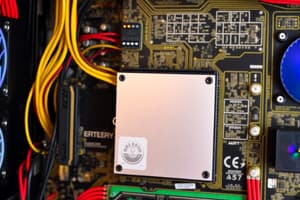Podcast
Questions and Answers
What are the primary goals of an operating system?
What are the primary goals of an operating system?
The primary goals of an operating system are to execute user programs, make solving user problems easier, and use computer hardware efficiently.
List the four main components of a computer system.
List the four main components of a computer system.
The four main components are hardware, operating system, application programs, and users.
How does the user view differ from the system view of an operating system?
How does the user view differ from the system view of an operating system?
The user view focuses on convenience and ease of use, while the system view emphasizes resource allocation and control of programs.
In what ways do users of dedicated systems interact differently with resources compared to shared systems?
In what ways do users of dedicated systems interact differently with resources compared to shared systems?
What challenges do operating systems face in managing resources for shared computers like mainframes?
What challenges do operating systems face in managing resources for shared computers like mainframes?
Why are handheld computers optimized for usability and battery life?
Why are handheld computers optimized for usability and battery life?
What role does the operating system play as a resource allocator?
What role does the operating system play as a resource allocator?
Describe how embedded computers differ in user interface design compared to mainstream computers.
Describe how embedded computers differ in user interface design compared to mainstream computers.
Flashcards are hidden until you start studying
Study Notes
Operating System Overview
- An operating system (OS) acts as an intermediary between users and computer hardware.
- Primary goals include executing user programs, solving user problems conveniently, and maximizing hardware efficiency.
Components of a Computer System
- Hardware: Fundamental computing resources consisting of CPU, memory, and I/O devices.
- Operating System: Manages and coordinates hardware usage among applications and users.
- Application Programs: Define resource utilization methods to solve user computing problems, including software like word processors, compilers, web browsers, database systems, and video games.
- Users: This category includes people, machines, and other computers interacting with the system.
User Perspective of Operating Systems
- Emphasis on convenience and ease of use; resource utilization is often not a concern.
- In a shared system (e.g., mainframe), the OS must ensure satisfaction among multiple users.
- Dedicated systems (e.g., workstations) have exclusive resources but may often access shared resources from servers.
- Handheld devices (e.g., mobile phones) are designed with limited resources, prioritizing usability and battery efficiency.
- Some systems (e.g., embedded computers) may lack a user interface altogether.
System Perspective of Operating Systems
- OS functions as a resource allocator, managing all computer resources and resolving conflicting requests for optimal and fair usage.
- Acts as a control program, overseeing program execution to prevent errors and misuse.
- There is no universally accepted definition of the exact components of an operating system.
Studying That Suits You
Use AI to generate personalized quizzes and flashcards to suit your learning preferences.




